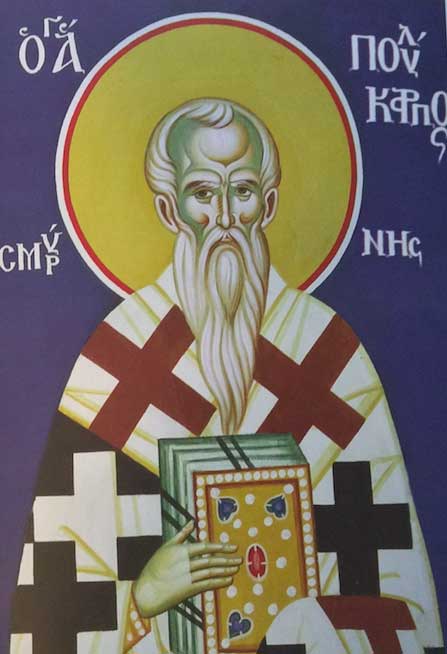The Martyr's Cup
The Commemoration of Polycarp
February 23, 2018
February 23 marks the commemoration of Polycarp, Bishop of the Church of Smyrna, an important port in ancient Asia Minor (modern Izmir). Polycarp, at least 86 years old at the time of his martyrdom ca. 155, was taught by the Apostle John in his youth. John wrote an inspired letter to the Church in Smyrna from Patmos (Revelation 2:10: "Do not fear what you are about to suffer.").

Around AD 110, when Polycarp was a young bishop in Smyrna, he received a letter from the Bishop of Antioch, Ignatius, who was on his way to Rome in chains to face martyrdom. Ignatius wrote:
Stand firm, like an anvil being struck with a hammer. It is the mark of a great athlete to be bruised, yet still conquer. But especially we must, for God's sake, patiently bear all things, so that he may also bear with us. Be more diligent than you are. Understand the times. Wait expectantly for the one who is above time: the Eternal, the Invisible, who for our sake became visible; the Intangible, the Unsuffering, who for our sake suffered, who for our sake endured in every way. (Letter of Ignatius to Polycarp, 3)
Forty-five years later Polycarp was burned in the arena for confessing Christ. He was hammered again and again with questions, threats, demands, and offers of clemency if he would only renounce Christ. In one case he was told to declare, "Away with the atheists!" which meant condemning the Christians and their faith in Christ; Christians were often deemed atheists for their rejection of the pagan gods and goddesses.
"So Polycarp solemnly looked at the whole crowd of lawless heathen who were in the stadium, motioned toward them with his hand, and then (groaning as he looked up to heaven) said, 'Away with the atheists!'" (Martyrdom of Polycarp, 9.2)
But the magistrate persisted with more threats and appeals, all to no avail. The eyewitness authors of the Martyrdom conclude their account by noting their ongoing remembrance of Polycarp's martyrdom:
"There, when we gather together as we are able, with joy and gladness, the Lord will permit us to celebrate the birthday of his martyrdom in commemoration of those who have already fought in the contest and also for the training and preparation of those who will do so in the future." (18.3)
A different sort of birthday party. The martyrs' birthdays into eternal life mark the narrow way through the Cross by which sinners, children of Adam, regain paradise, like the Good Thief. Repentance and death to the flesh, new birth in the Spirit:
For all who are led by the Spirit of God are sons of God. For you did not receive the spirit of slavery to fall back into fear, but you have received the spirit of sonship. When we cry, "Abba! Father!" It is the Spirit himself bearing witness with our spirit that we are children of God, and if children, the heirs, heirs of God and fellow heirs with Christ, provided we suffer with him in order that we may also be glorified with him. (Romans 8:14-17)
I recall the identical words of address, "Abba, Father," being on the lips of the Son in Mark 14:35, during the Agony in the Garden. The connection between suffering and sonship is clear, as Paul points to it here as well: "provided we suffer with him." The true godly suffering we endure is never alone, however. It is always "with him," who remains with us to the end of the age.
In Gethsemane, Jesus accepts this "cup" from the Father. Polycarp in the arena in Asia is at the same address, the same place, as in Gethsemane and thus speaks of "the cup of Christ." In his last prayer:
"O Lord God Almighty, Father of your beloved and blessed Son Jesus Christ, through whom we have received knowledge of you, the God of angels and powers and of all creation, and of the whole race of the righteous who live in your presence, I bless you because you have considered me worthy of this day and hour, so that I might receive a place among the number of the martyrs in the cup of your Christ, to the resurrection to eternal life, both of soul and body, in the incorruptibility of the Holy Spirit. May I be received among them in your presence this day. . . ." (14.1-2)
New birth requires a willing death to self. We take up our crosses that we may enter eternal life. We carry them with the Lord to Jerusalem, the Upper Room, Gethsemane, Golgotha, the Empty Tomb, and Beyond. There are no detours on this road, but life evermore at the end in the Holy Trinity.
Yours for Christ, Creed & Culture,

James M. Kushiner
Executive Director, The Fellowship of St. James
—James M. Kushiner is Executive Editor of Touchstone: A Journal of Mere Christianity, and Executive Director of The Fellowship of St. James.







